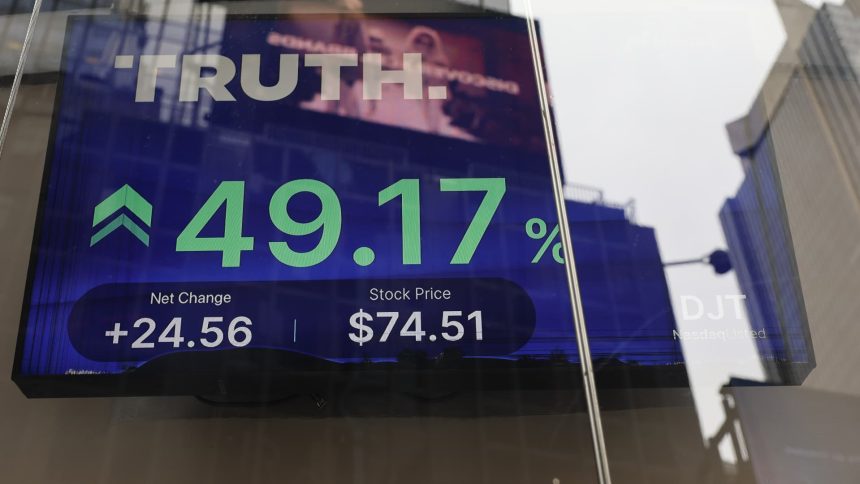So-called meme stocks are having a moment again. What do Reddit , Trump Media & Technology Group and GameStop all have in common? They all have strong retail participation. Trump Media made its market debut on Tuesday under the ticker DJT, following its merger with shell company Digital World Acquisition Corp. The new business has a current market capitalization of about $9 billion A market cap of roughly $9 billion would put Trump Media on par with the names in the lower end of the S & P 500 , making it comparable to Caesars Entertainment , American Airlines and Mosaic . Reddit, which is not in the S & P 500, also has a market cap of about $9 billion Market capitalization Trump Media & Technology $9.4 b. Reddit $9.2 b. Caesars Entertainment $9.4 b. American Airlines $10 b. Mosaic $10.3 b. This is rather remarkable, considering Trump Media had revenues of roughly $3.3 million. The company lost $49 million in the first nine months of last year, according to The New York Times . GameStop, in comparison, had a small profit in its fiscal year , with revenues of $5.2 billion. The market cap is about $4 billion. Even if you think of these as meme stocks, this is quite a difference. GameStop has a small profit, revenues of $5.2 billion and a market cap of $4 billion. DJT has revenues of $3 million, loses money and has a market cap of $9.4 billion. GameStop makes Trump Media & Technology look like JPMorgan. Another stock that has been a high flier is Reddit, which has surprised everyone by almost doubling its initial public offering price of $34 within days of its debut, a reversal of the usual pattern in which high interest IPOs decline after their first trading session. Reddit has given an undetermined number of shares to its site moderators, who are part of its loyal user base. What meme stocks have in common What Trump Media, GameStop and Reddit have in common is a high retail base. That means there is a large base of individual investors rather than institutional. Retail investors tend to move more on emotion and are less concerned with old-school metrics like fundamental analysis, which attempts to determine what the correct price for a stock should be based on estimate of future profitability and dividends. Each of these three stocks has a user base with a strong attachment to the product or the founder. It doesn’t mean that the laws of investing have been repealed. Fundamentals do matter When GameStop first exploded in early 2021, plenty of retail traders messaged to inform me that this proved that a dedicated, organized group could move a stock and that fundamentals don’t matter. This, of course, is nonsense. A stock is a share of ownership in a company, entitling the stockholder to a claim on the company’s earnings and assets. That is literally the definition of a stock. Fundamental analysis was developed as a way to make a guess at what that future stream of profits, including dividends, would look like. You can see this in the charter of the very first modern stock company, the Dutch East India Company, which began operations in 1602. The company was set up to import spices from the Moluccas in eastern Indonesia, but it quickly expanded. In its charter , the Dutch East India Company said that ownership would entitle shareholders to receive profits from the sale of spices. According to this document, whenever the cargo arrived in port, the company was required to provide “a statement listing the goods received, and what the state the cargo is in. And what the proceeds received from sale of the merchandise are shall also be provided to the Provinces or cities, when they request this. … As soon as 5% of a return cargo has been cashed shall it be distributed to the participants.” Here, in the very first modern stock company, the owners tell you: You are buying our stock to participate in profits from the spice trade. Every company since then has made essentially the same promise: You’re buying our stock to participate in the profits from the business we are in. Have the laws of investing been repealed? As for GameStop, it has been in a long, slow descent since mid-2021, going from roughly $75 ( split adjusted in July 2022) to about $13 after the company reported disappointing sales this week. Almost every single person who has bought GameStop in the last three years is in the red. Looking out on the future of the gaming retailer, Michael Pachter of Wedbush, one of only two analysts who cover GameStop, noted that the company was continuing to see sales decline due to falling hardware sales, fewer large console releases and the growth of video game subscription services. The retailer is not in imminent danger of going under, but Pachter noted, “If we’re right, GameStop has a likely runway of no more than five years. The demise of GameStop is outside the 12- month window we use for our price target, but we expect the company’s demise at some point later this decade.” What’s it all mean? Back in the 1990s, we often had a man named Arch Crawford on our air. He gave investing advice based on astrology — I kid you not. If the stars and planets were properly aligned, it might be the right time to buy Microsoft. You might be surprised to hear that he had a following. If enough people decide they want to invest on astrology or sunspots or on the personality of a single man— or they just want to HODL and believe the stock will do well — it might be possible to move the stock, and leave everyone scratching their heads. But eventually, the story crumbles. Fundamentals do matter. You may not believe in gravity, but gravity very much believes in you.
Read the full article here




